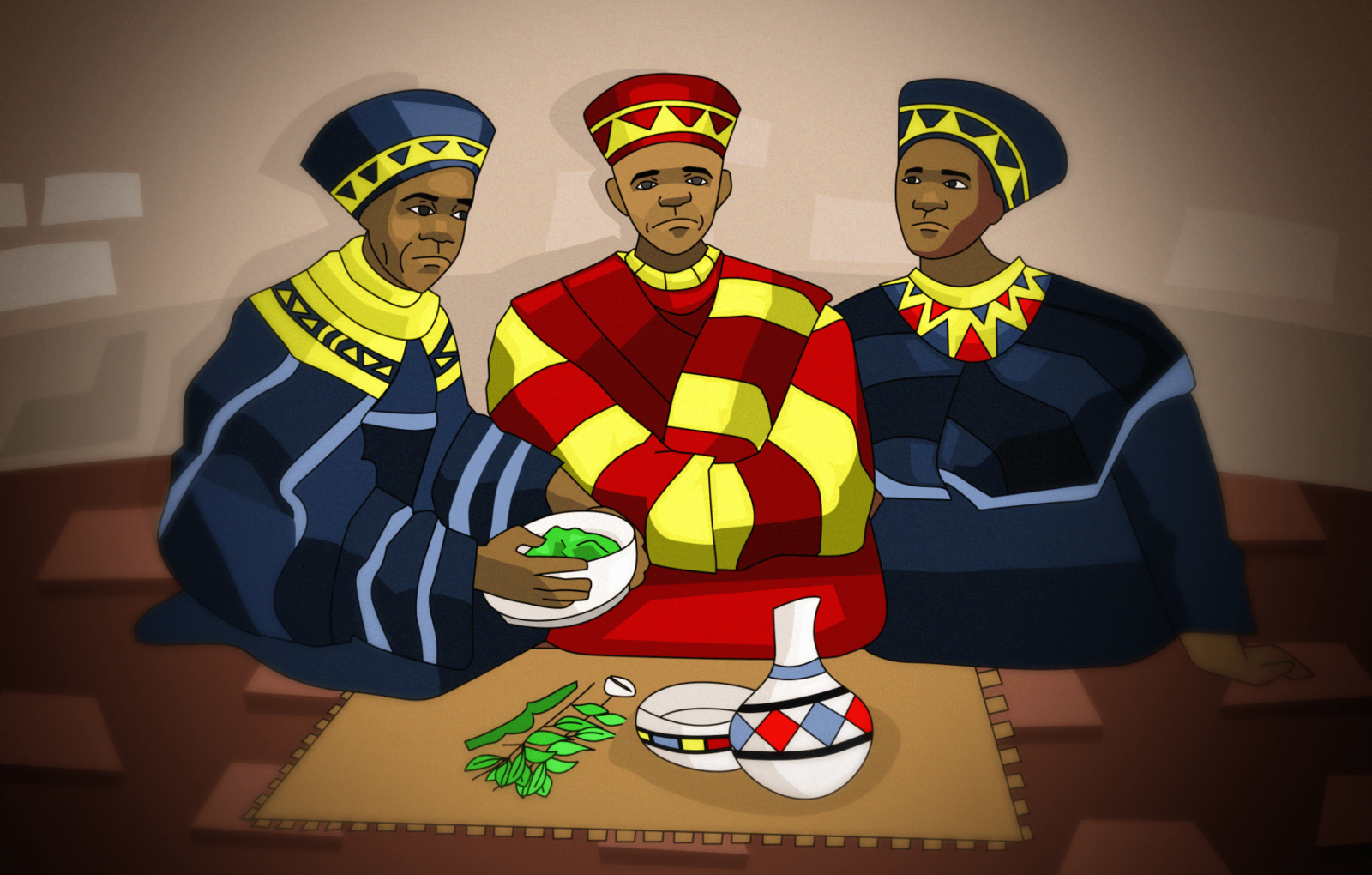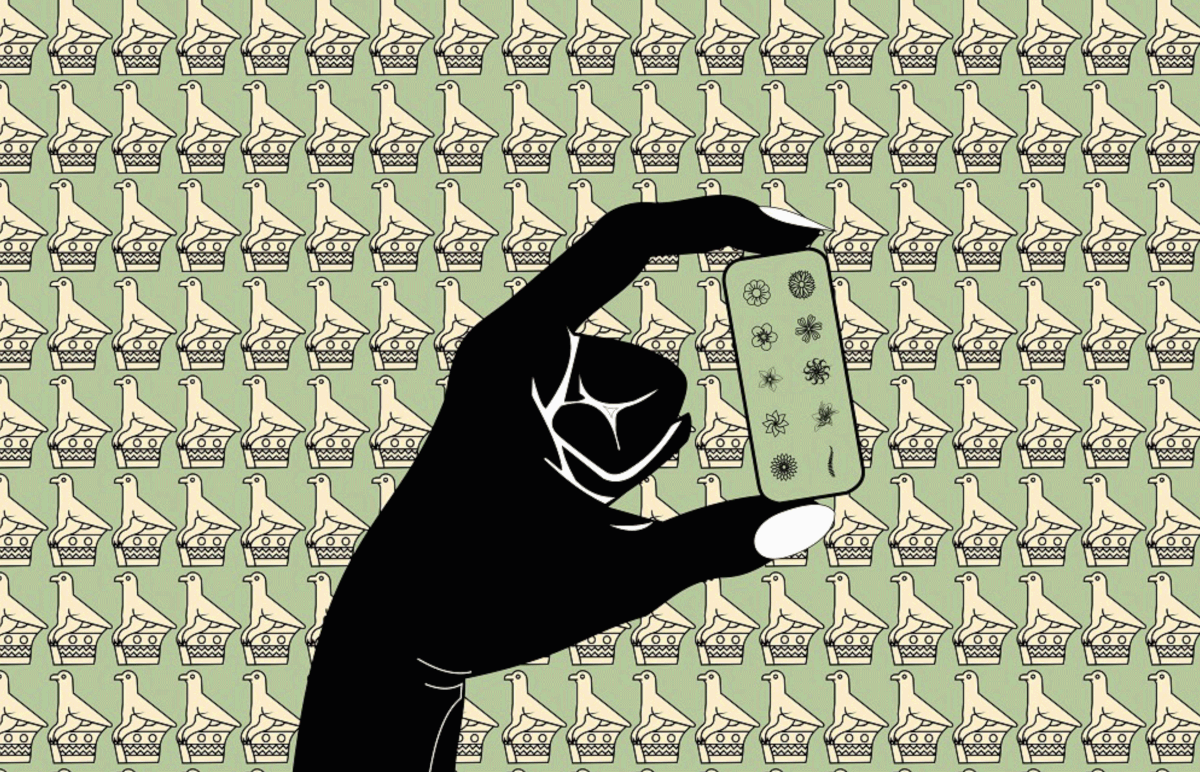‘No respect for our ancestors’: Traditional healers in Zimbabwe resist regularisation of practice
- Faced with the adverse effects of the Covid-19 pandemic on the health system, authorities in Zimbabwe are looking to traditional medicines for answers, which its practitioners are not as willing to give.

Image description: Three traditional rulers dressed in Zimbabwean attires sit frowning and facing a mat that has on it bowls used for the practice. The subjects on the left and right are both dressed in dark blue outfits with hints of yellow while the subject in the middle is dressed in a red outfit with touches of yellow too.
Harare, Zimbabwe (Minority Africa) — In Stoneridge, a relatively new suburb in Harare, a building stands out. In the yard is a hut with thatched roofing, an unusual occurrence in urban areas. In this hut, Loriet Magunje, a spirit medium and traditional healer, treats and consults with her patients. But this is just her ‘office’, she does not stay here.
On a regular afternoon, Magunje arrives at her work premises in a car and is met by a small group of women and men sitting on the veranda of an asbestos-roofing building opposite the hut, eagerly waiting to see her. In the driveway is another group of young men and women in traditional dance gear.
As she arrives, the group in traditional dance gear scurries to fetch their instruments. A few minutes later, they join Magunje, who is now also dressed in traditional gear, in the hut, singing along with her. This ritual is done before she speaks to anybody.
Getting Magunje to talk about her work and history was quite a task.
“I don’t like talking about my history. I talked about it once and I will not do it again. It brings me a lot of pain to keep bringing the issue up. Even my ancestors would not be happy,” she tells Minority Africa.
Magunje said she did not fancy entertaining interviewers unless her ancestors allowed it because most of them asked her patronizing questions.
She revealed that she started communicating with her ancestors at an early age and was already healing people by around the age of 12 and then proceeded to talk about how traditional healing practice is shrouded in secrecy.
“Intricate details about the practice of traditional spiritual healing are not for public consumption. They are a mystery and should remain secret to preserve its sacredness,” she says.

Magunje is just one of many traditional healing practitioners in Zimbabwe who keep a tight lid on their knowledge. This has been the norm amongst traditional healers for centuries, but only recently has it proved to be problematic.
Faced with the adverse effects of the Covid-19 pandemic on the health system, authorities in Zimbabwe are looking to traditional medicines to find answers.
A committee of academics and researchers was set up by the government in February this year to facilitate research on traditional medicine through correspondence with traditional healers.
Their objective is to record information on herbs used by traditional healers to regularise and mainstream the practice.
But these efforts are hitting a brick wall as many traditional healers like Magunje are refusing full disclosure of their knowledge with researchers.
“We should never be likened to or expected to behave as pharmacists and conventional doctors because the basis of our skills is different,” she says. “I would never be willing to share my knowledge with these people and their colleagues. Often, they show no respect for our ancestors.”
Sophia Mataruse, 70, another traditional herbalist who practices in Masvingo, a city in Zimbabwe, also allayed similar sentiments. Mataruse sells herbs for ailments such as infertility, back pain, menstrual problems, among others.
“If I sell you these roots, that is where I get my sugar. Now if I tell you where to find it and you go and get it yourself, what will I eat?” she says.
“These conventional doctors learn their skills in schools where they pay to go, but they just want to come to us and expect us to dish out all the information for free? That is unheard of,” Mataruse adds.
Statistics from the Medicines Control Authority of Zimbabwe (MCAZ), an organization responsible for regulating medicines and registering them, indicate that only two out of the 234 traditional and complementary medicines registered with the authority are from local practitioners; the rest are from other countries like China.
This is despite studies showing that Zimbabwe has over 5000 plant species, and about 1,800 to 2,000 of them have medicinal properties.
Joice Guhwa, Registrar of the Traditional and Medical Practitioners Council, a regulatory authority for the practice of traditional medicine said most traditional healers seem to be afraid that their knowledge will be ‘stolen’.
“Generally, practitioners are not so keen to share information. It’s still a mammoth task to get them to trust researchers,” she said.
“The best way to address the issue of fear of intellectual theft is to educate them more on intellectual property rights, and we are trying to do that. Some of the knowledge practitioners claim is theirs are already in the public domain,” Guhwa explains.
According to Guhwa, the overall objective of such exercises was to remove the practice from individuals and nationalize it so that traditional medicine practices can be more accessible to the public.
Despite being unregulated, studies show that over 80 percent of Zimbabweans consult traditional healers and rely on traditional medicines although many do so in hiding because of the stigma associated with the practice.
Furthermore, the International Religious Freedom report (2017) indicates that around 86 percent of Zimbabwe’s population are Christians whose faith frowns upon African Traditional Religion.
Only 2 percent of the population claim to adhere exclusively to traditional beliefs.
Professor Charles Maponga, a scientist who has been involved in traditional medicine research said that discussions around mainstreaming of traditional medicines have always been there.
Together with his team, Maponga has facilitated a traditional medicine certificate course at the University of Zimbabwe that is intended to teach traditional medicine practitioners about processes of regularising their medicines.
“[The course] trains traditional healers and natural therapists on processes like how to submit dossiers for registration and issues to do with intellectual property rights,” he says.
Mainstreaming and regularisation of traditional medicine practice are envisaged to make the work of practitioners easier, more recognized, and could eventually end the stigma associated with their practice. So why do most traditional healers seem to be uncooperative?
Traditional healer, Prince Mutandi, 53, who is also the secretary for education and research in the Zimbabwe National Traditional Healers Association (ZINATHA), a group of traditional healers and herbalists said authorities should change their approach and earn the trust of practitioners
“These researchers should first approach associations like ours so that we can engage our members. If they go directly to them they will not win,” he says.
“After the trust is established, information on our medicines can be revealed, it’s not forbidden. The issue is [that] we cannot be expected to be happy dishing out our knowledge for nothing in return.”
He added that processes of mainstreaming traditional medicines are often too slow and authorities should see to it that they speed them up so that the public can benefit from the knowledge.
Mutandi, who resides in Mufakose, a suburb in Harare, has been practicing traditional medicine for 25 years but the number of patients he received during the Covid-19 pandemic increased.
In the wake of inflation and the rising cost of living, most people in low-income communities like Mufakose cannot afford to seek conventional medical assistance.
According to Professor Maponga, the Covid-19 pandemic has ignited urgency to regularise the traditional medicine sector because it created an extra justification for people to look to nature-based remedies for new approaches to treating the disease.
“Covid-19 came and there was no known treatment for it, but since it is an upper respiratory tract infection, we have always known, in the traditional sense, of managing such ailments using home remedies,” he says.
“We are saying to traditional healers, ‘You own your medicine but we just want you to be trained and registered under the existing rules.’,” Professor Maponga adds.
Sharon Munjenjema is a multi-media journalist based in Harare, Zimbabwe. She has worked for local and international media, reporting untold stories in her community. Her stories mostly cover health, science, environment and political topics. Recently, she has taken an interest in telling stories of minorities from a solutions angle.






